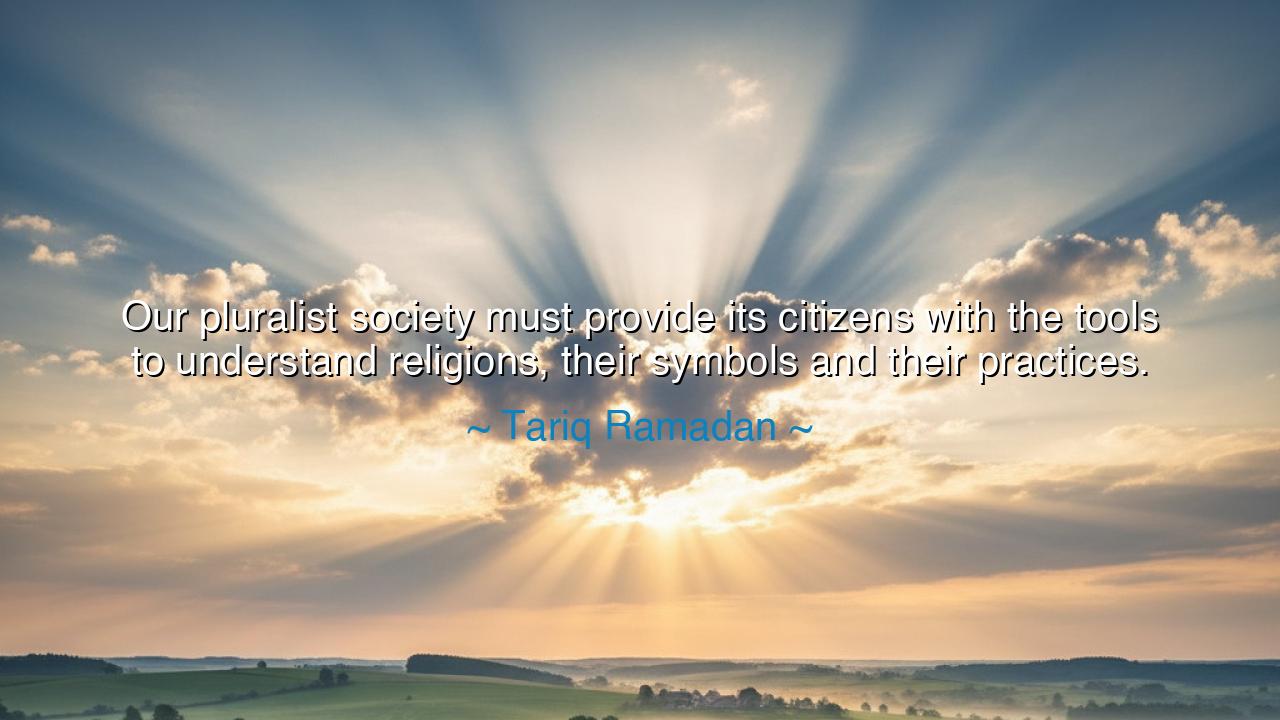
Our pluralist society must provide its citizens with the tools to
Our pluralist society must provide its citizens with the tools to understand religions, their symbols and their practices.






Tariq Ramadan speaks with the wisdom of one who has walked among many cultures when he declares: “Our pluralist society must provide its citizens with the tools to understand religions, their symbols and their practices.” This is not a mere call for tolerance, but for understanding—a deeper and nobler path. For tolerance alone is a passive thing, a silence of conflict; but understanding is active, it is the labor of the heart and the mind. A society of many peoples and many creeds cannot endure upon tolerance alone, for silence breeds suspicion, and suspicion breeds division. Only when the citizens are given the tools of knowledge can they see the sacred in their neighbor’s faith, and learn that difference need not be enmity.
In the days of the ancients, ignorance of the other was the seed of war. When the Greeks met the Persians, each called the other barbarian, not because they were without civilization, but because they did not speak the same tongue or revere the same gods. Had they understood each other’s symbols and practices, perhaps fewer fields would have been drenched in blood. So it is in our age: without knowledge, we reduce the other to caricature, to shadow, to threat. Ramadan’s words are a warning against this blindness, and a reminder that the health of a pluralist society depends upon the courage to learn.
Consider the story of Moorish Spain, Al-Andalus, where for centuries Muslims, Christians, and Jews lived side by side. Though not without strife, it was in many ways a beacon of coexistence. Knowledge of each other’s traditions, languages, and sacred writings allowed scholars, physicians, and poets to flourish together. From this mingling arose works of art and learning that lit Europe in its darker ages. It was not mere tolerance that made Al-Andalus shine, but a spirit of curiosity and engagement with the religions and symbols of one’s neighbors. When that spirit waned, when suspicion overtook understanding, the harmony dissolved, and persecution followed.
To understand a religion is not to adopt it, but to see the humanity within it. A cross, a crescent, a lotus, a prayer shawl—these are not just marks of separation, but windows into how men and women reach toward the divine. To reject them without knowledge is to close the eye of the soul. But to seek their meaning is to discover the threads of common yearning that bind all humanity: the longing for justice, the hope for mercy, the search for truth. Ramadan’s call is therefore not only political but spiritual: to build bridges where walls now stand.
This task is not easy, for ignorance is comfortable, and suspicion is effortless. But the labor of understanding is like the labor of the farmer who tills the soil: difficult, but fruitful. When a child learns not only the stories of their own faith, but also the sacred tales of others, they grow into a citizen who cannot be easily swayed by hatred. When a society builds schools, libraries, and dialogues that embrace all traditions, it arms its people not with weapons of war, but with tools of peace.
The lesson, then, is clear: if you would live in a land of many voices, you must learn to listen with both ears and both eyes. Do not dismiss the prayer of your neighbor; ask instead what it means to them. Do not mock the symbol you do not know; seek instead the story it carries. In this practice lies the antidote to division. If every citizen commits to this path, suspicion will wither, and compassion will grow.
So let the teaching endure: “Our pluralist society must provide its citizens with the tools to understand religions, their symbols and their practices.” For in such understanding lies the strength of nations, the preservation of peace, and the honor of humanity itself. A society that teaches its people to see the sacred in the other is a society that will not fall to hatred. Therefore, be seekers of wisdom, bearers of knowledge, and guardians of understanding—for in these virtues rests the future of civilization.






AAdministratorAdministrator
Welcome, honored guests. Please leave a comment, we will respond soon